As long as we have had live hockey broadcasts, be it on radio or television, we have had talented people to call it. After nearly 100 years of commentary on the game, some iconic calls have been uttered that are synonymous with the sport. Names like Foster Hewitt, Bob Cole, Al Michaels, Rick Jeanneret, and Chris Cuthbert are legends of the broadcast booth, and their calls will be forever etched into the annals of history. Here are some of the most iconic calls in hockey history.
Bob Cole Says Goodbye to the Soviets
In 1975, the Cold War was in full swing, and tensions between the Soviet Union and the West were still high. In the midst of Team Canada’s victory over the Soviets in the 1972 Summit Series, both the West and the Soviets were beginning to become more open towards the idea of cooperation in sports.
Related: When the Russians Were Better Than Us
The result of this was the Super Series ’76, a tour of the NHL that both the Soviet Red Army (also known as CSKA Moscow) and Soviet Wings (Krylya Sovetov Moscow) would undertake from December of 1975 to January 1976. The Red Army was the most dominant team in the Soviet League and the match-up was deemed the best of the Soviet League clubs vs the best of the NHL clubs.
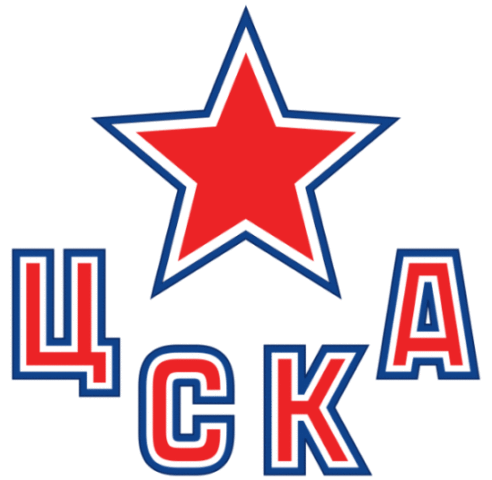
The Red Army was scheduled to play the New York Rangers, Montreal Canadiens, Boston Bruins, and Philadelphia Flyers. The lesser-discussed Wings were playing the Pittsburgh Penguins, Buffalo Sabres, Chicago Blackhawks, and New York Islanders. The Red Army defeated the Rangers and Bruins quite handily, while their 3-3 tie with the Canadiens is still heralded as one of the greatest games in history. The major press from the series comes from the game against the Broad Street Bullies, who in 1975-76, were defending Stanley Cup Champions, and played a style of hockey that was the polar opposite of the Soviets.
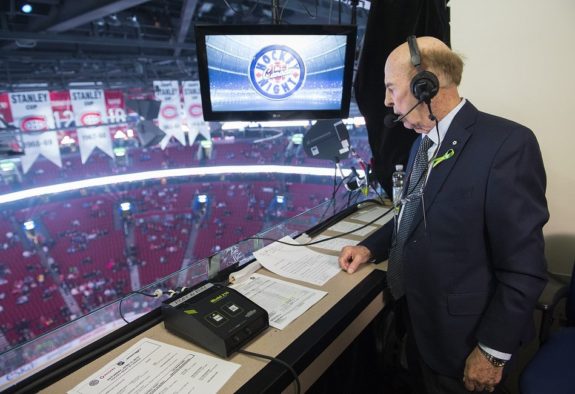
In the first period, Flyers defenseman Ed Van Impe skated out of the penalty box and directly to Soviet star Valeri Kharlamov, who already had a history with the Flyers because of Bobby Clarke’s slash in the 1972 series. Van Impe delivered an elbow to the head of Kharlamov, knocking him out. This, alongside the rough play of the Flyers, prompted Red Army coach Konstantin Loktev to tell his team to leave the ice after a penalty was not given. While the team left, Cole uttered the now-famous line.
The Soviets are leaving! They’re going home!
Bob Cole, January 11, 1976
While the Soviets would return to the ice, the Flyers would continue to beat down on them, eventually defeating them 4-1, the Red Army’s only loss of the series. Despite this, Philly’s victory is what is still mentioned to this day.
Brad May Finishes The Bruins
The 1993 NHL Playoffs saw some spectacular moments, especially in overtime. As the Canadiens set an NHL record with 10 OT victories on their way to a Stanley Cup, another iconic overtime game tends to be overlooked. The Sabres were in the midst of a four-game sweep of the Bruins, but it was a fiercely competitive series, with three of the four games going into extra time.
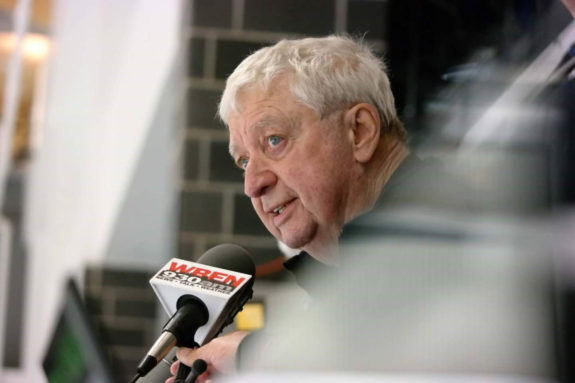
In the final game of the series, the Bruins had a 5-2 lead just two minutes into the second period, and it looked like Boston would live to fight another day. Then the Sabres began their comeback, with Donald Audette making it a two-goal game just over a minute later.
Related: Watch: Rick Jeanneret calls Jack Eichel’s first OT winner
Going into the final frame, the Sabres had a chance, and that is all they needed. It took just over 11 minutes for the Sabres to tie the game, with Alexander Mogilny scoring his sixth goal of the playoffs and second of the game, and Yuri Khmylev following it up less than a minute later. This set the stage for one of the most iconic and celebrated goals in Sabres history.
Brad May, who made his hockey career as an enforcer was in his second season with Buffalo, and despite his physical play and nearly 250 PIMs that year, he scored 13 goals in the regular season, but all would pale in comparison to his goal that night.
At the 4:48 mark of overtime, May put the puck through Hall-of-Fame defenseman Ray Bourque’s legs and deked out Bruins goalie Andy Moog, before depositing the game and series-winning goal into the back of the net. The Sabres broadcast led by long-time commentator Rick Jeanneret delivered the famous call that went down in hockey history.
Mayday! Mayday! Mayday! Mayday! Mayday! Brad May wins it in Overtime!
Rick Jeanneret after Brad May’s OT winner April 24, 1993
Despite that the Sabres didn’t win the Cup that season, bowing out to the Canadiens in the Adams Division Final, that season was memorable for Buffalo, and added another great piece of broadcasting to Jeannert’s portfolio.
The Golden Goal
After it was revealed that Vancouver would host the 2010 Winter Olympic games, the eyes of Canadians focused on two things: the fact that Canada had never won a gold medal on home soil, and how Team Canada’s hockey team would perform. Hockey Canada was under the spotlight after their embarrassing seventh-place finish at the 2006 Winter Olympics. However, by the time the 2010 games concluded, those major concerns were answered, culminating in one of the greatest games of Olympic hockey ever played.
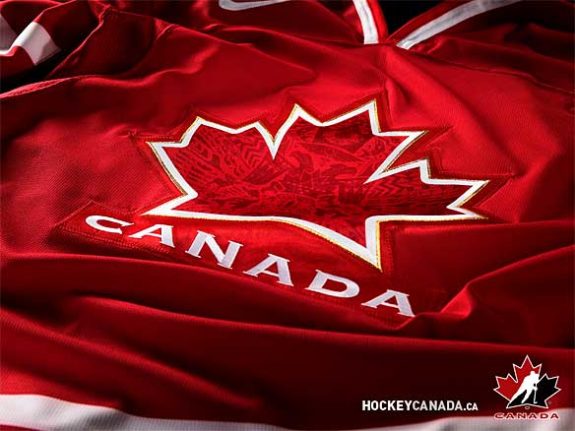
Team Canada didn’t reach the gold medal game with ease, finishing third in their group and had to play Germany, Russia, and Slovakia before their match-up with the United States on the final day of competition. Canada had won 13 golds so far at the games, and a win would set the record for a host nation. Canada had already lost to the U.S in the group stage and was under pressure to secure what would be one of the most significant moments in Canadian sports history.
Related: Projecting Canada’s 2022 Olympic Hockey Team
When Canada took a two-goal lead halfway through the second period, the Americans started to chip away. Ryan Kesler scored to put the U.S within striking distance. Nonetheless, Canada held the lead going into the third. With American goalie Ryan Miller pulled, Zach Parise tied the game with only 25 seconds remaining, sending the game into overtime. With fans from both Canada and the United States on the edge of their seats, the stage was set for one of the most iconic goals in Canadian history.
With Sydney Crosby and Jarome Iginla on the ice, they played give-and-go along the boards. Crosby sent the puck to Iginla, who was pressed against the boards battling with American defenseman Ryan Suter. At the same moment, Crosby had broken free from Brian Rafalski and headed towards the net. He called for the pass from Iginla, which was picked up on the broadcast as an audible “IGGY!”, and slid the puck through Miller’s five-hole, which won Canada the gold, and broadcaster Chris Cuthbert delivered the famous call.
Sydney Crosby! The Golden Goal! And Canada has a once-in-a-lifetime Olympic Gold!
Chris Cuthbert February 28, 2010
This game is heralded as one of Canada’s defining moments in sports and was the first of two straight Olympic Gold medals. Coming off a performance in Turin where they were embarrassed, reinvigorated the hope of Canada’s team. When you factor in that the win came against their heated rival and southern neighbor, the victory becomes even more iconic for Canadian fans.
Paul Henderson Ends the War on Ice
In 1972, the Cold War between the Soviet Union and the West was at an all-time high. The Soviet Union had dominated amateur hockey for years, allegedly using “professional” hockey players by claiming their occupation was jobs in the Soviet military. In protest, Hockey Canada boycotted the 1972 Olympic Games by not sending a team, and they would do the same in 1976.
Related: Paul Henderson: Career, Accolades, Cancer
Negotiations began between the two nations to organize a best-on-best series that would feature the best professionals from Canada and The Soviet Union, something that had not been allowed in the World Championships or Olympics. Out of these discussions came the 1972 Summit Series, an eight-game series that would have four games in various Canadian cities, and four games in the Soviet capital of Moscow. The war on ice had begun.
In September of 1972, the Soviets came to Canada to begin the series. Canadian fans and media alike underestimated the Soviet team, predicting an easy win for the Canadian team. In the four games that took place in Canada, the Soviets humbled everyone. They returned to Moscow with a 2-1-1 record and were in prime position to beat Canada. When the Soviets took game five, they needed only one more win to take the series. Canada needed to go on the offensive, and they did.
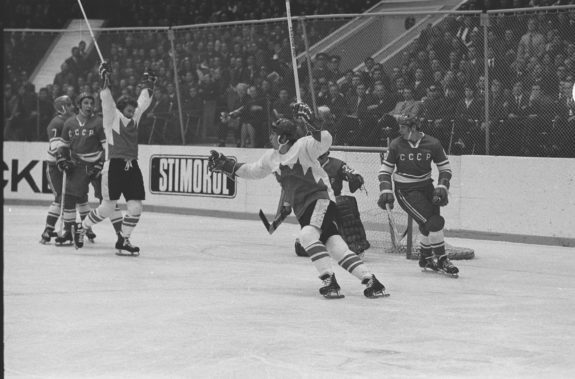
Canada won the next two games and tied the series. However, the Soviets said that they would claim victory if the series ended in a 3-3-1 tie due to the advantage in goals scored. With the game tied with only 34 seconds left in the third period, Paul Henderson jumped on the ice with Yvan Cournoyer and Phil Esposito, and CBC broadcaster Foster Hewitt delivered the most iconic line in Canadian sports history.
Henderson made a wild stab for it and fell. Here’s another shot. Right in front, they score! Henderson has scored for Canada!
Foster Hewitt September 28, 1972
Canada would hold on and win, capturing game eight, and the series. To this day, “Where were you when Henderson scored?” is a popular question to those who were around for the game, and the saga is burned into the Canadian ethos.
The Summit Series marked a turning point for both international hockey, and how the game was played in Canada. Training methods changed, and the world saw how hockey could be played with a dedication to skill, rather than the more physical Canadian way. The series was also a turning point for Canadian-Soviet relations, as another series was conducted in 1976 between the best of the World Hockey Association and Soviets.
The Miracle On Ice
The 1980 Winter Olympics, hosted by the United States in Lake Placid, New York became home to the biggest David vs Goliath story in hockey history. Going into the games, the Soviet Union had won its fourth straight hockey gold and were the obvious favorites to win their fifth. Team USA, on the other hand, was made up of mostly college players from the state of Minnesota. Suffice to say, they were not expected to do anything significant in 1980.
Related: “Miracle on Ice” 40 Years Later: Where Are They Now?
What the Americans lacked in talent, they made up for in spirit. The young team finished second in their division behind Finland and advanced to the medal round. The United States would have to play the juggernaut Soviets, who had yet to lose and had scored 51 goals in only five games. On February 22, 1980, the United States played the most iconic game in its history and would make waves across hockey.
The United States kept pace with the Soviets, ending the first period with a 2-2 tie despite being heavily outshot. The second period was another dominating effort from the Soviets, outshooting the Americans 12-2 and taking a one-goal lead. With the Americans down a goal, they began their comeback. Mark Johnson tied the game at three, and just a minute and a half later captain Mike Eruzione scored to give the Americans the lead. With the U.S. now leading, they just needed to hold on to secure the win.
With time running out, the thousands of Americans in the crowd began a countdown. Al Michaels, who was broadcasting the game for NBC delivered his famous call as the seconds ticked away.
You’ve got 10 seconds, the countdown going on right now! Morrow, up to Silk. Five seconds left in the game. Do you believe in miracles? YES!
Al Michaels Febuary 22, 1980
The U.S. pulled off the biggest upset in sports history, but that isn’t what won them the gold medal. A few days later, the Americans beat Finland to win the gold. The game spawned movies, documentaries, and is constantly revisited by those in hockey. Sports Illustrated named the Miracle on Ice the greatest moment in 20th-century sports.
Broadcasting’s Place in Sports
As long as we have hockey broadcasts, we will have the personas who call the moments we remember most. The plays are what will be recalled in the history books, but the words spoken by the commentators are why they are engrained in our memories and our hearts.